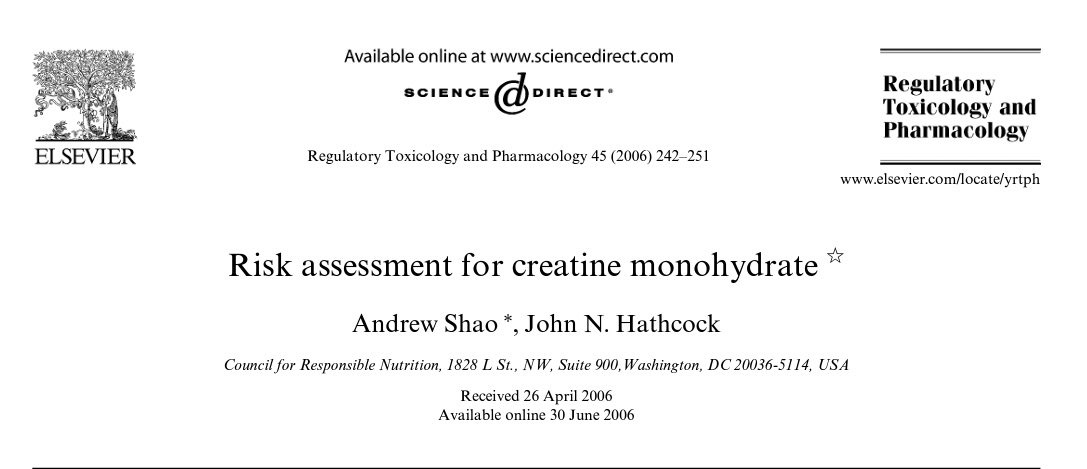Did you know that there is a journal called “Regulatory Toxicology and Pharmacology” and in 2006 it published “Risk assessment for creatine monohydrate?”
It’s true. Let’s see what a toxicology journal has to say.
It’s true. Let’s see what a toxicology journal has to say.
First, they discuss the history and use.
Then they attempt to determine a safe Upper Level of Intake (UL) by searching the literature for hazard from excessive intake and assign a dose-response relationship to said hazard.
Then they attempt to determine a safe Upper Level of Intake (UL) by searching the literature for hazard from excessive intake and assign a dose-response relationship to said hazard.
Then they consider uncertainty and assign an uncertainty factor (UF)
The UL is derived from the No Observed Adverse Intake Level (NOAEL) or Lowest Observed Adverse Effect Level (LOAEL), and the UL=NOAEL/UF.
The UL is derived from the No Observed Adverse Intake Level (NOAEL) or Lowest Observed Adverse Effect Level (LOAEL), and the UL=NOAEL/UF.
“If no data establish adverse effects in humans, the above procedure cannot be used. In these circumstances, identify the highest intake level with sufficient evidence of safety as a value named the OSL by CRN (Hathcock, 2004) and the HOI by FAO/WHO.”
“none of the clinical trials found a clear adverse effect related to creatine administration, there is, by definition, no basis for identifying a LOAEL”
The researchers could not determine a lower or upper limit so they determined the Observed Safe Level (OSL).
The OSL is basically the evidence-based amount with strong safety data.
They picked what they determined to be the most relevant RCTs that reference safety. See below.
The OSL is basically the evidence-based amount with strong safety data.
They picked what they determined to be the most relevant RCTs that reference safety. See below.
They used Derave 2004 as their basis for the OSL b/c:
Typical loading dose
Followed by 5g/d for 19w
And no significant inc in creatinine or urea.
The remaining studies gave support to this OSL.
https://journals.physiology.org/doi/full/10.1152/japplphysiol.00206.2004
Typical loading dose
Followed by 5g/d for 19w
And no significant inc in creatinine or urea.
The remaining studies gave support to this OSL.
https://journals.physiology.org/doi/full/10.1152/japplphysiol.00206.2004
“With respect to clinically relevant markers, none of the studies reviewed showed clinically relevant changes in serum creatinine or urea, urinary albumin, or liver enzymes.”
Even though Derave 2004 was 8 subjects “there is a collection of other randomized controlled trials conducted in healthy adults using creatine doses at, above and below 5g/d all demonstrating and/or reporting no adverse effects.” (Table 1)
“Application of risk assessment methodology to the available published human clinical trial data involving creatine supports a high level of confidence in this ingredient with respect to its safe use in dietary supplements.”
No evidence of harm 5g/d.
No evidence at greater amounts but not enough info to give a higher g/d recommendation.
Perhaps it’s time to update this?
No evidence at greater amounts but not enough info to give a higher g/d recommendation.
Perhaps it’s time to update this?

 Read on Twitter
Read on Twitter





